Betty White Changed My Life
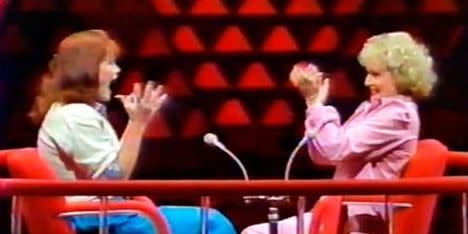
It was the spring of 1983, and I was balancing a black-handled curling iron in one hand and a can of Aqua Net Super Hold in the other, trying like hell to look like Belinda Carlisle of the Go-Gos. Mom sighed from the living room, where she sat clipping coupons. Her sandpapery remarks drifted over the sound of her snipping scissors.
"While you're trying to make yourself into a movie star, this stack of laundry ain't gettin' smaller."
I rolled my eyes at her in the bathroom mirror, trying not to singe my forehead.
Mom scowled a lot in those days. Every morning, I'd plant my butt on our love seat with chocolate Pop-Tarts and a glass of milk and wait for The New $25,000 Pyramid to come on. The game show was addictive: Each contestant had a list of words and phrases and had to get her partner to guess as many of them as possible before a 30- or 60-second clock ran out. I loved it, and I was good at it, too. But my mother wasn't impressed. "Just sittin' there like a bump on a log," she would mumble under her breath, just loudly enough for me to hear.
Mom thought watching television was a waste of time. We had polar-opposite perspectives, so there was a lot of teary shouting and loud door-slamming back then. I was 20 and thought I knew everything. She, on the other hand, was an older parent — she and my dad had been in their mid-40s when they adopted me as a baby — and had grown up during the Depression, standing in breadlines and going without shoes in the winter. In her eyes, I was lazy and spoiled, an attention seeker, a dreamer in a world that had no place for dreams. Two years earlier, when I'd broached the topic of going to college, she'd just sighed. "Land yourself a stable, hardworking man" was her advice. My dad, a factory machinist who'd dropped out of school to support his family when his father was killed in an industrial accident, had been her ticket out of Arkansas.
But growing up in the 1970s in Oxnard, a seaside city in southern California, surrounded by orchards and thriving businesses, I had bigger dreams for myself. My goal was to become a famous comedic actress like Gilda Radner. I'd go around the house quoting a bumper sticker I had seen that said Fortune lies just around the next corner. I believed it, which was why I loved Pyramid. Within an episode, a person's whole life could change.
What my mom didn't know was that I wasn't simply whiling away a half hour every day watching that show. I was working. I'd convinced myself that if I could become a contestant, I'd win enough money to move out and get my own apartment. If I could get on that show, I knew I could win and be on my way to a new life — away from my mom and her pinched view of the world.
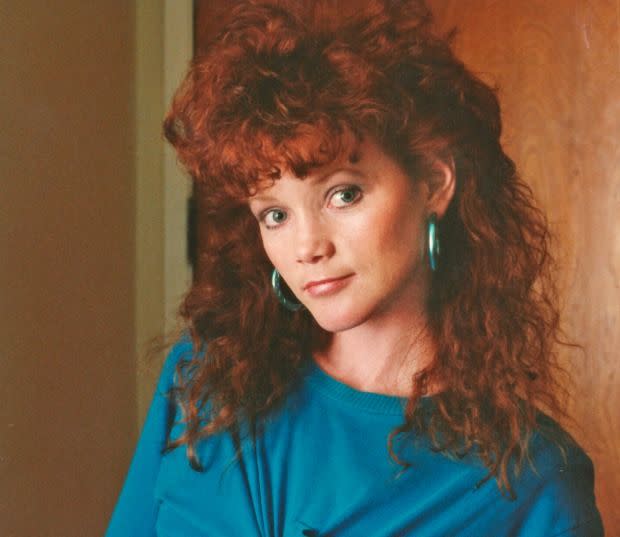
After a year of practicing, I finally got up the nerve to audition. A week later, I found myself in a windowless office with so many applicants, some people had to stand in the back. Glancing around the room made my stomach churn. I'd overlooked a crucial detail: The show rarely featured people my age. Most of my competitors seemed to have a broad knowledge of all subjects — knowledge you get through life experience or college. I was studying theater at a local community college, where I spent more time attending cast parties than class. My mouth was still full of braces, and I looked about 15, not like a serious contender.
But then I nailed every question during a mock game — the second part of the audition, after a long, difficult quiz. My assigned partner was visibly nervous before we began. The paper with answers in our category, "Things You Associate With Power," shook in his hands.
"The office, I mean, the place in Maryland," he blurted. "No! I mean, the President…"
"The Capitol!" I screamed. "The White House!"
"Correct!"
"Uh, the little plug thing? On your wall?"
"Electricity!"
"Right!"
And so it went. As we filed out, Cheryl,* the contestant coordinator, smiled at me. Some of us, she said, would be getting a phone call.
Weeks drifted by, then months. I didn't utter a word to my mom about the tryout. I was afraid she'd give me her standard line, "Stop dreaming and start doing." In the meantime, my rigorous training regimen continued. I crammed, reading our Encyclopaedia Britannica and scrutinizing the show with new eyes, searching for patterns — any tidbits my opponents might overlook.
As I studied, I could hear Mom's voice in my head: "Don't think it to death, Einstein; the simplest answer is usually the right one." As it turned out, she was right. One morning, I struck gold, a nuance I'd never noticed before. In the first part of the game, you had to guess words that fit a particular category, but in the Winner's Circle round, for the big prize, the game flipped — one contestant gave a list of words, and her partner had to guess which category they belonged in. That day I realized that the final answer often revolved around a verb. Most people pictured the clues as what they were instead of as what they did. Hope sprung up inside me. Here it was: my trump card.
Finally, one hot August morning, the phone rang. It was Cheryl. "Hello," she said. "Are you still interested in going on the show?"
I managed to sound casual when I said yes, but my head went woozy. Imagining that stage, those television lights, Dick Clark patting me on the back … maybe that bumper sticker was right.
Cheryl instructed me not to wear black, white or tiny prints on the show. "No jeans or T-shirts, either," she warned. "We need you in brightly colored professional attire." Pyramid taped five episodes in one day, which meant I needed five wardrobe changes. My leg warmers, glittery headbands and metallic shoes weren't going to cut it. So, a week before the show, I went to Macy's and bought five blazers and matching skirts. When I put them on, I looked like a law-firm secretary.
On the day of the taping, I was up before daylight, packing up my beat-up Chevy Vega. That morning, I tiptoed around the house while Mom snored, oblivious to my plan. I should've been at school that day, but I was skipping. Mom wouldn't expect me home before 4 p.m.
The air inside the studio was cool and crisp. Thirty or so contestants clustered noisily around Cheryl, holding their outfits.
Cheryl spent about an hour going over all of the rules, then announced the celebrity contestants. When she said "Betty White," we gasped as if she'd announced we were flying to Paris for lunch. A favorite on the game-show circuit since the 1950s, Betty was famous for her smarts; she knew the rules inside and out. She was also my fantasy mom: fun and sweet, yet a little risqué, everything my stone-faced mother was not.
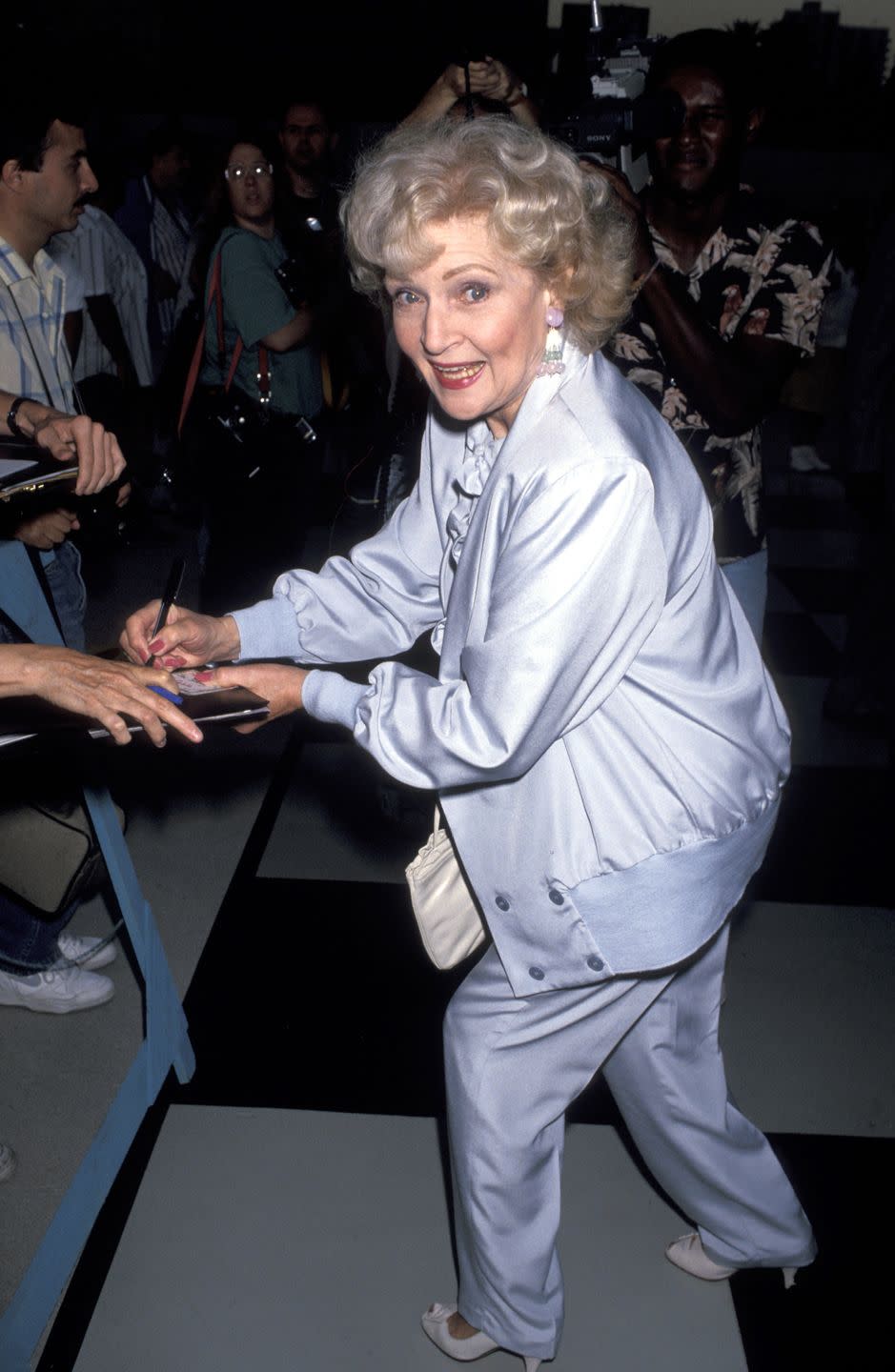
The set was dazzling, exactly as it appeared on television, with a red carpet and bright, twinkling lights. The contestants' names had been written on index cards and put into a briefcase. Now Cheryl withdrew the cards one by one, sending people to the stage in teams of two while the rest of us watched from the audience. The hours passed quickly at first, then slowly; by four o'clock, I was rubbing my temples. Then Cheryl pulled the next cards from her briefcase. She called my name. "You're up!" I thought I'd throw up right there.
Suddenly, butterflies were doing the tango in my stomach. Before I knew it, I was onstage, face-to-face with Betty White. With her Texas-sky–blue eyes and her dimples, she looked like a baby doll I'd once carried around. "Hi, I'm Betty," she said, patting my hand. Perhaps she noticed the terror in my eyes, because then she whispered, "Honey, you'll do just fine."
My opponent, Alan, sat with the actor Ed Begley Jr. at the other console. As Betty and I went back and forth against them, the studio audience laughed in all the right places. I was scared out of my wits, but rehearsing at home must have burned something into my brain, because every time Betty gave a clue, I answered easily — and when I gave her clues, she responded like a psychic. By the commercial break, somehow I'd managed to tally the highest score.
Dick spoke to me as if we'd known each other for years, "Let's head to the Winner's Circle and try for $10,000!"
My heart was thumping so hard, I wondered if Betty could hear it.
Dick reviewed the rules. "Remember, Betty, you can't use hand gestures, and you're only allowed to give her a list of items — no descriptions. You've got 60 seconds. Here's your first subject. Go!"
The electronic timer began to beep, and everything around me went black. Betty's face, illuminated before me, was all I could see. Her angelic smile disappeared. Now she was stone-cold serious.
"Words, spelling…" she began, her clues surgically precise.
"Things in a dictionary!"
"Moles, freckles…."
"Things on your skin?"
Applause erupted like hot, crackling grease.
Every second felt as if it could be our last. Finally, Betty paused, her eyes narrowed, and I knew: It was the final subject. Everything went still. Suddenly I could hear my mom's voice whispering inside my head: "It's right there in front of your face."
And that's when I knew. No matter what Betty said, I'd see what it did, not how it looked.
"Coins," Betty said.
I drowned her out by screaming three words:
"THINGS YOU FLIP!"
The studio exploded with noise and movement — the audience's squeals, blaring music and commotion everywhere. People jumped up and down, crowding the stage. It was like midnight on New Year's in the middle of Times Square. The pyramid twinkled and flashed. Betty grabbed me in a bear hug. "Good girl!" she shouted.
I was light-headed, and my knees wobbled. Through tears, I said the first words that came to mind: "I gotta call my mom!"
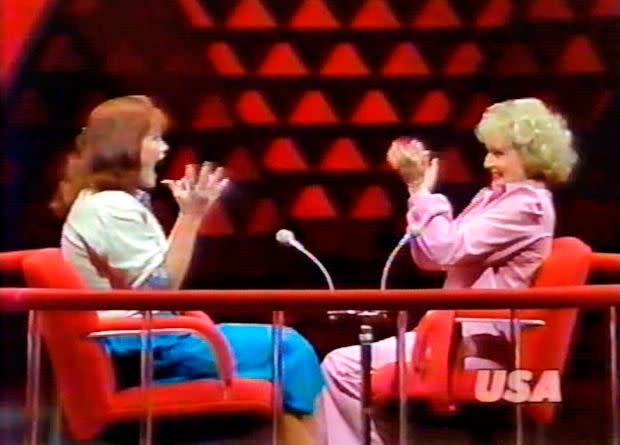
Looking back on that moment, I wish my mom had been there. She rarely cried, but that day tears would have wet her blue dress, the one good dress in her closet. She'd have thrown her arms around my neck and said "I knew you could do it!" and then, "Hell, I don't raise idiots!"
I know now why I wanted to share that triumph with her most of all. My competitive spirit, the part of me that made me practice relentlessly and do whatever it took to win — all of that I got from her. The courage it took her to leave Arkansas to make a new life in California: That's where I got the guts to compete with college-educated people three times my age. And the perseverance I needed to memorize every detail of that show, day after day, for nearly a year? I'd learned it from the woman who had picked cotton until her fingers bled to support her husband while he looked for a "real" job in California, attached to a union, with a pension. I wanted to win not to get away from my mom, as I'd thought, but to prove my worth to her. I wanted her to be proud of me.
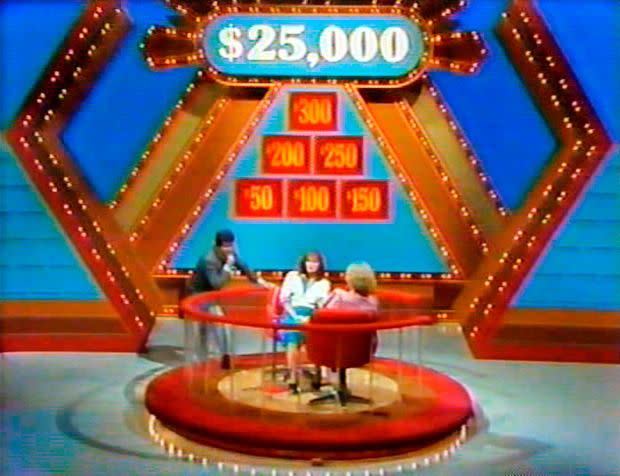
That night, after the 90-minute drive back from Hollywood, I burst through our front door yelling, "Mom! You'll never guess!" It was nine o'clock, and she was already in bed.
"Where the hell have you been all damn day?" she asked, her voice groggy from sleep.
"I've been in L.A., at a television studio!" I said, shivering with excitement. "Mom, I got on The Pyramid — and I won!"
She scowled at me with suspicion. "Oh, hellfire! Is that the best lie you can come up with?"
"I knew you wouldn't believe it. I really won — look!"
I unfolded the sheet of paper the prize department had given me in place of the real check, the token that proved I was as smart as anyone and deserving of Mom's praise. She fished her glasses out of her drawer.
Mom's mouth froze open. Her eyes darted up and down the page. I couldn't take the silence, so I knelt by her bed, facing her.
My working-class mother had never had lofty dreams for herself, or for me, because she didn't know how to dream. Dreaming is a luxury of the middle class, I'd later learn; my mom knew only how to survive. Poverty had hardened her, and sometimes she took her pain out on me. Still, I loved her. And in that moment, I was gripped by an inexplicable craving to spoil her. "Mom," I said, my voice shaking. "What would you like more than anything? A new sewing machine? To take a trip?" She'd never been on an airplane in her life.
Finally, she let out a sigh. The flesh around her chin wobbled as she looked up at me.
"Well, I'll be damned."
Then she said it again.
*Names have been changed
Interested in diving into another moving, original story written by a reader like you? This October, e-book publisher Shebooks is releasing a second anthology — a collection of four heartwarming essays gathered from our joint fall 2013 writing contest, including a longer version of this story by Mashaw McGuinnis. Download the e-book to your mobile device for $2.99 at shebooks.net.
Mashaw McGuinnis won five game shows in the 1980s. Today she lives with her husband in northern California and divides her time between writing and winning her battle against Lyme disease. Read about her work at mcguinnis.com.
You Might Also Like